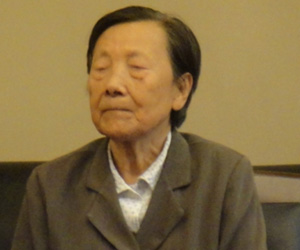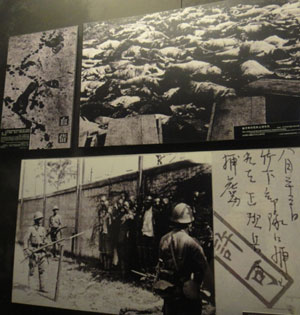|
|
|||||||
| |
||||||||
|
||
|
|
|||||||
| |
||||||||
|
||
NANJING, China - I've never been able to imagine the depth of the suffering of victims of the Japanese occupation, even of Filipino comfort women, until I met a survivor of the Nanjing Massacre in China.
Imagine witnessing your family members killed - some even raped and pretending to be dead among thousands of corpses just to survive.
This is the story of Xia Shuqin, one of the massacre survivors whom I met during a recent trip with other foreign reporters upon the invitation of China Radio International (CRI) Online.
According to the historical account of the Chinese Memorial Hall of the Victims of the Nanjing Massacre, the Japanese military killed more than 300,000 Chinese people - around 20,000 of whom were raped - during its attack on China's then capital Nanjing in late 1937.

Nanjing massacre survivor Xia Shuqin. Photo by KIM TAN
"The Japanese killed three generations of my family, my grandparents, parents, and my sisters. The Japanese also injured me with swords three times. I just lay there with the corpses for 10 days. I felt I was dying," said Xia in Chinese.
Zhu Cheng Shan, curator of the Memorial Hall, said seven of Xia's family members were killed, while her mother and two older sisters were raped.
"After they killed the two sisters, they put something in their vagina," he told the foreign reporters in Chinese.
Xia, now 83 years old, was seven when the tragedy happened. Only Xia Shuqin and her four-year-old sister escaped the massacre.
"I almost lost my family. How would I survive?" she said.
"She cried for a lot for a long time after the tragedy... she just had a miserable life after the war," added the curator.
But Zhu, who was answering for Xia because some of her memories have faded due to age, said that the survivor's life began to get better when she met a wonderful husband.
Unfortunately, her husband passed away 30 years ago, leaving her with three children whom she managed to raise on her own.
Until now, Xia says she is still waiting for the Japanese government to take responsibility for the massacre.
"We haven't gotten any official apology for the Nanjing Massacre... High-ranking officials (have admitted it) but some suspect and deny the veracity of the massacre," said Zhu.
The curator asserted that the figure of more than 300,000 Chinese nationals killed is not an imaginary number, and has been confirmed by the Nanjing War Crimes Tribunal.

Nanjing memorial hall display. Photo by KIM TAN
Despite what happened, Xia said she does not hold a grudge against the Japanese people.
"I think most Japanese people are friendly... I love peace, I do not wish any war on the world," she said.
Xia, who was the first massacre survivor to visit Japan in 1994, added that some Japanese nationals even helped her when she filed and won a libel suit against two Japanese historians and a publisher who accused her of faking her account of the gruesome massacre.
Zhu also said they welcome any Japanese who wishes to come to China or their museum, which displays scenes from the war including the soldier' chambers and the destroyed houses of local families.
The main exhibition room contains evidence and accounts of the 1937 massacre such as names, pictures, and narratives from the victims and witnesses of the tragedy. Many of the artifacts are available to the public through an archive called the "file wall," a row of cabinets piled on top of each other.
In one part of the Memorial Hall, the preserved skeletal remains of some victims that were excavated in an area in Nanjing called Jiangdongmen in 1985 are displayed. Around 200 more skeletons were uncovered in 1998.
The 28,000-square meter facility also has outdoor exhibits such as statues, sculptures, tablets, a wall where the names of the victims are listed, and a walkway displaying the footprints of some survivors.
"This museum has been open (for sometime). We welcome any Japanese who is willing to visit," Zhu said. He added that around 50,000 tourists come to Nanjing from Japan every year.
Quoting from the inscriptions inside the Memorial Hall, Zhu said most Chinese believe that "history is forgivable but not forgettable" and that "people should remember history but not hatred."
Posted with permission from the author
Original link sa GMA News website: http://www.gmanews.tv/story/235666/lifestyle/a-poignant-history-lesson-in-nanjing
| © China Radio International.CRI. All Rights Reserved. 16A Shijingshan Road, Beijing, China. 100040 |